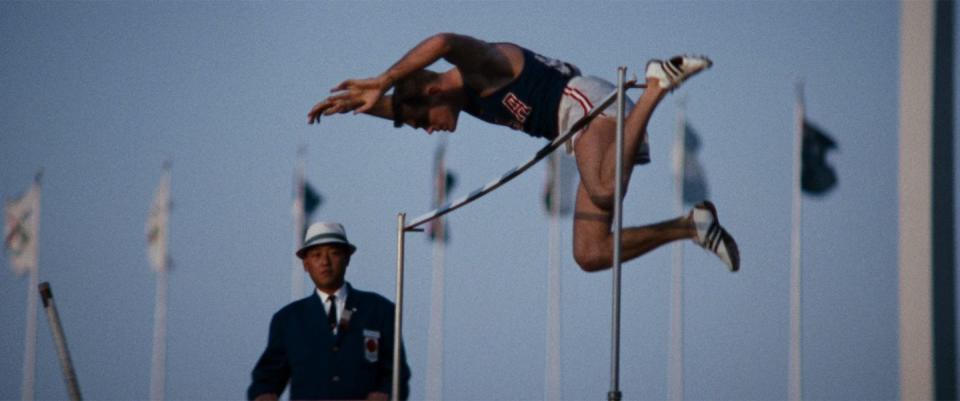Recommended Re-Viewing: This Cult Japanese Doc Will Satisfy All Your Olympics Longings

Recommended Re-Viewing is a series in which we make the case for re-watching an old film or TV series which you can stream without leaving your house. It might be a plot that’s so bad it’s good, a scene which deserves more interrogation or a director’s underrated gem.
Here, Esquire features director Miranda Collinge holds a torch for Kon Ichikawa’s cult 1965 documentary, Tokyo Olympiad.
In case you’d forgotten, right now we should have been deep into the final week of the 2020 Tokyo Olympics, gasping from our sofas at all those powerful, taut bodies jumping and running and lunging and generally throwing themselves about. Obviously Covid-19 has hard-rained on the Olympics parade, but imagine how good it would feel to pretend, just for a few minutes – or let’s face it, now that we’re all “working” from home, hours – that the only thing that mattered in the world was whether or not it would be Fred Hansen of the USA or Wolfgang Reinhart of Germany (absolutely NO subtext there) who successfully cleared 5.1m in the pole vault?

Well, thanks to a classic Japanese documentary, Tokyo Olympiad, which captured the Games the last time they were in Tokyo, in 1964, I have, and you can too. Directed by Kon Ichikawa, who stepped in for Akira Kurosawa late in proceedings, the film was commissioned by the Japanese government to capture the spirit of the Games. And capture it he did, in a mesmerising mood piece that lasts anywhere from the Japanese Olympics committee's rather churlish 93-minute version, to the 168-minute director's cut recently reissued on DVD and Blu-ray by the Criterion Collection; though if you want to split the difference, a two-hour cut is currently available on the Olympics’ own YouTube channel.

What makes Ichikawa’s film so surprising, and so special, is that he chose not to focus solely on heroic feats and sporting glory, but on the small stuff. The weird stuff. Athletes ducking to the floor as they get buzzed by a flock of pigeons released in the Opening Ceremony. A Russian shot putter, Nikolay Karasyov, performing a series of superstitious tics that makes Rafael Nadal look like Matthew McConaughey. Germany’s Wolfgang Reinhart solemnly combing his hair as he readies himself to accept his silver medal in the pole vault (what? It’s been 56 years!). Stewards in natty blue blazers fussily rearranging a drinks table during the marathon (and speaking of natty, look out for glimpses of Italian sprinter Livio Berruti in the men’s 4x100 relay final delivering a one-man masterclass in sporting sprezzatura).

This was also an era when Olympians really were amateurs with actual day jobs, as the occasional clipped RP voiceover reminds us. Here were car mechanics, med students, or in the case of defending marathon champion Abebe Bikila of Ethiopia, a captain in Emperor Haile Selassie’s Imperial Guard. As we watch Bikila defend the gold medal that he won in Rome in 1960 – although this time, he’s not barefoot – the camera spends three whole minutes lingering on his feet and his face, his skin glistening, his eyes locked on the road, as Toshiro Mayuzumi’s electrifying orchestral score builds to a climax. It’s less sports telly, more euphoric meditation.
Does Bikila do it? OK, if you don’t know, I won’t tell. Now more than ever, it'd be nice to have something to look forward to.
Like this article? Sign up to our newsletter to get more delivered straight to your inbox
You Might Also Like


